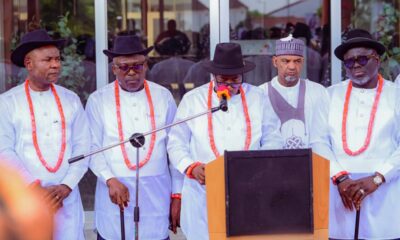News
Gbaramatu Community May Sue For Genocide
The people of Gbarmatu Kingdom of Delta State have called for the probe of the military operations in their communities by the Commander of the Joint Task Force, Major General Sarkin Bello.
The community threatened to drag Gen Bello to the International Court of Justice for alleged genocide and destruction of their homes and sources of livelihood.
But JTF spokesperson, Colonel Rabe Abubakar, has consistently maintained that the task force’s troops displayed high level of military professionalism in carrying out their duty, stressing that the Nigerian Army has received accolades for its peace keeping activities from all over the world.
Leaders of the community said contrary to claims by government and JTF, their kinsmen were yet to return home several weeks after the May 17 aerial attacks on the community by JTF aircrafts, adding that the operation also led to the burning of all habitable homes in the community.
Addressing newsmen in Warri, the Amaokusuwei (eldest man) and Amabebefityewei (Spokesperson) of Kurutie, Chief Dickson Wereyesegha and Chief Moneyin Pori respectively, castigated the JTF for purportedly misinforming the public about atrocities carried out there.
Wereyesegha, who said he spent two days in the bush during the operation, said, “The Kurutie community will join other destroyed communities in Gbaramadtu to bring the JTF Commander Maj.Gen. Sarkin Bello and his cohorts to book at the International Court of Justice in The Hague for genocide against us.
“All the houses that were inhabited in Kurutie Community are either destroyed by the aerial bombardment and sporadic shooting or burnt down by members of the JTF through willful setting ablaze of each house.
“Kurutie has no link with Camp 5. How on earth will the JTF claim that the only house burnt in Kurutie was because they were shot at from houses in the community? Nobody in Kututie community have access to arms. The JTF just framed up an excuse to kill defenseless citizens and wanton destruction of property.
“Up till now we cannot find most of our aged chiefs, elders and mothers who could barely escape; they are all still in the bush without access to the refugee camp at Ogbe-Ijoh,” they added.
Besides, the Kurutie elders described the process of distributing relief materials to the displaced person in the community as selective and under the dictates of the leadership of the JTF.
Nevertheless, they asked the Federal Government to expedite action on their return to their destroyed communities, maintaining, that they do not want to continually live as refugees in their own country.
Meanwhile youths from oil producing areas of Delta State yesterday protested the fates of thousands of persons by the military operations in Gbaramatu Kingdom of Warri, Delta State and urged the state government to take action to enable them return to their various communities.
The Association of Youths from Oil Producing Areas of Delta State (AYOPAD) said, “Invading the region and attacking innocent civilians thereby displacing them from their homes merely reduced government’s efforts and portray this government as staging region war against its own citizens.”
President of the association Ebiakpo Ezebri, Lucky Okoro and Nevile Okubo who signed the statement said, “Our association frowns at the idea of military men destroying the riverside communities in a bid to hunt for militants in their hideouts.
The statement flayed past government for its approach, allegedly anchored on appeasement rather than addressing the root causes of underdevelopment and marginalisation of the oil bearing communities in the management of their resources.
It advised government to approach the region’s issues with ‘Integrated Conflict Management System”, stressing that this approach include conflict prevention and peace promotion and consolidation; conflict control and abatement as well as conflict resolution.
News
Fubara Attends PDPGF Meeting In Asaba …..Back Court Verdict On National Secretary Position

Rivers State Governor, Sir Siminalayi Fubara, last Friday, attended the Peoples Democratic Party Governors’ Forum (PDP-GF) meeting in Asaba, the Delta State capital.
The Rivers State Governor, who is the Vice Chairman of the PDP Governors’ Forum, attended the meeting, alongside 10 other Governors of the party’s controlled states across the six geopolitical zones of the country.
The first PDPGF meeting in 2025, was held at the Government House in Asaba, at the end of which a seven-point resolution was reached.
Reading the communique at the end of the meeting, the Chairman of the Forum, and Governor of Bauchi State, Senator Bala Mohammed urged the National Working Committee (NWC) to put every machinery in place to ensure a hitch-free NEC meeting on March 13, 2025.
The communique stated:
“The Forum, having examined all the notices required by law to be given to validly convoke NEC, advised NWC to reschedule NEC to the thirteenth (13Th) of March 2025.”
The Forum further noted the Court of Appeal judgment affirming Udeh Okoye as the National Secretary of the party, saying that as a party that believes in the rule of law, it will respect the position of the Appellate Court on the matter.
“The Forum noted with delight the ongoing efforts at resolving the crisis in the National Working Committee, NWC, on the position of the National Secretary, and has reaffirmed its support for the Court of Appeal judgment; consequently, the Forum advised the NWC to set up the machinery for the effective implementation of the court judgment.
“While commending the country’s valiant and patriotic Armed Forces and Security Agencies for maintaining the frontline in securing the country and the gains of our gallant personnel against bandits in parts of the country, the Forum viewed with deep concern, the resurgence of brazen non-state actors. It, therefore, calls for the strengthening of the nation’s security architecture.”
Governors in attendance include: H.E Senator Bala Abdulkadir Mohammed (Bauchi State); H.E Sir Siminalayi Fubara (Rivers State) – Vice Chairman; H.E Rt. Hon. Sheriff Oborevwori (Delta State) – Host; H.E Dr. Agbu Kefas (Taraba State); H.E Rt. Hon. Ahmadu Umaru Fintiri (Adamawa State); and H.E Dr. Dauda Lawal (Zamfara State).
Others are H.E Senator Ademola Adeleke (Osun State); H.E Senator Douye Diri (Bayelsa State); H.E Pastor Umo Eno Ph.D (Akwa Ibom State); H.E Dr. Peter Mbah (Enugu State); H.E Barr. Caleb Mutfwang (Plateau State);
and H.E Bayo Lawal (Deputy Governor, Oyo State), who represented Governor Seyi Makinde.
News
NGO Implants Free Pacemakers Into 22 Cardiac Patients In PH
A United States based Non Governmental Organisation, Cardiovascular Education Forum, in collaboration with the University of Port Harcourt Teaching Hospital (UPTH), has successfully implanted free pacemakers into 22 patients with different cardiac cases in Port Harcourt.
This is in a bid to save lives and encourage patients with low heartbeats to live longer.
The implantable device, which costs $20,000 each, was inserted free of charge on the selected patients.
Speaking during a Special Hospital Ground Rounds at the UPTH with its Theme, “Recent Advances in Cardiac Pacing,” a cardiac Physiologist, Dr Neil Grub, said the NGO was in Nigeria to improve training and learning on cardiac issues and help patients with cardiac problems.
Accompanied by a team of experts comprising a cardiologist and cardiac device implanter, Dr Jagdeep Siagh, and UPTH interventional cardiologist, Dr Edafe Emmanuel, Dr Grubb said pacemakers were inserted on patients with low heartbeats to boost their heart rates.
Earlier, the Chief Medical Director, UPTH, Prof Henry Arinze Ugboma, said each of the implantable devices cost over $20,000.
Ugboma, represented by the Chairman, Medical Advisory Committee, UPTH, Prof Datonye Alasia, said the partnership between UPTH and the foreign NGO was to build networks, and improve services in terms of healthcare delivery, training and learning.
According to him, there is now a ray of hope in terms of treatment of patients with cardiovascular cases in the hospital.
He said the UPTH started the collaboration with Cardiovascular Education Forum in 2018 to boost health, training and learning on cardiac health.
He assured that, “in coming years, the scale of our collaboration with the mission will be higher.”
Chinedu Wosu
News
FG Unveils National Broadband Alliance To Drive Internet Access
The Federal Government has unveiled the National Broadband Alliance, a new initiative aimed at transforming the nation’s digital infrastructure and boosting connectivity across the country.
The initiative was unveiled yesterday in Lagos by the Minister of Communications, Innovation, and Digital Economy, Bosun Tijani, who was represented by the Executive Vice Chairman of the Nigerian Communications Commission, Aminu Maida.
In his address, Tijani stated that NBAN would significantly enhance broadband penetration, which has grown from just six per cent in 2015 to approximately 42 per cent as of October 2024.
To support this agenda, he said the government was leveraging a Special Purpose Vehicle to deploy 90,000 km of fibre backbone across the nation, connecting underserved and rural communities to high-speed internet.
According to him, the initiative aligns with the Renewed Hope Agenda of President Bola Ahmed Tinubu, which prioritises innovation, technology, and collaboration as key drivers of national prosperity.
Tijani stated that the expansion would not only improve access to reliable broadband but also empower Nigerians, particularly in rural areas.
“While the progress made in broadband penetration is commendable, we recognise that much more needs to be done to ensure every Nigerian can enjoy the benefits of reliable, high-speed internet,” Tijani said.
The minister also emphasised the importance of strategic partnerships with donors, investors, and other key stakeholders in achieving the goals set out in the National Broadband Plan (2020–2025).
He said these collaborations would be essential in overcoming infrastructure development challenges and making broadband affordable and accessible for all Nigerians.
“These targets reflect our unwavering commitment to ensuring that broadband is accessible, affordable, and inclusive for all Nigerians. However, we are also aware of the challenges ahead,” he added.
Tijani stressed that achieving the government’s targets—70 per cent broadband penetration by 2025, a minimum internet speed of 25 Mbps in urban areas, and broadband access for 80 per cent of the population by 2027—will require sustained efforts.
“Achieving these goals will require more than just the efforts of the private sector. It will require a holistic approach that includes strategic partnerships with donors, investors, and other key stakeholders in accelerating the rollout of critical infrastructure,” he said.
-
Business10 hours ago
Oil Production Resumption: Ogoni Youths Seek Inclusion In FG’s Plans
-

 News12 hours ago
News12 hours agoSenate Reshuffles Committees, Appoints New Chairmen For Dev Commissions
-

 Nation10 hours ago
Nation10 hours agoBizman Alleges Threat To Life …Seeks Police , Govt’s Intervention
-
Rivers10 hours ago
NOSDRA D-G Disburses N150m To 300 Farmers In Rivers
-

 Niger Delta9 hours ago
Niger Delta9 hours agoOgoni Postgraduate Forum Tasks HYPREP On Scholarship Scheme
-
Business10 hours ago
NCDMB Assures Greater Local Industry Participation In Oil, Gas Projects
-

 News12 hours ago
News12 hours agoNigeria Strengthens Economic Ties With Germany To Boost Investment, Jobs
-

 Featured9 hours ago
Featured9 hours agoFubara Flags Off Upgrading Of 135 Primary Healthcare Facilities In Rivers

